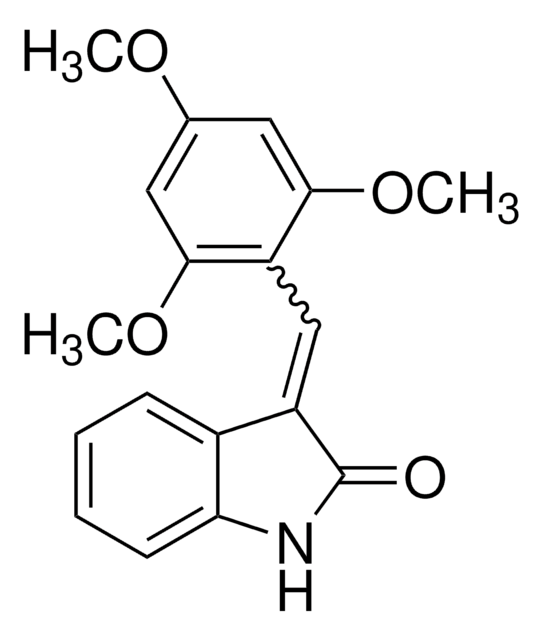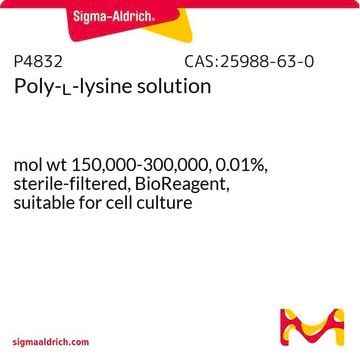400090
IC261
A cell-permeable, reversible, potent and selective inhibitor of casein kinase (CK1) that inhibits CK1δ (IC₅₀ = 0.7-1.3 µM) and CK1ε (IC₅₀ = 0.6-1.4 µM) isozymes.
Synonym(s):
IC261, 3-[(2,4,6-Trimethoxyphenyl)methylidenyl]-indolin-2-one, SU5607, Casein Kinase I Inhibitor VI
Sign Into View Organizational & Contract Pricing
All Photos(1)
About This Item
Empirical Formula (Hill Notation):
C18H17NO4
CAS Number:
Molecular Weight:
311.33
MDL number:
UNSPSC Code:
12352200
Recommended Products
Quality Level
assay
≥95% (sum of two isomers, HPLC)
form
solid
manufacturer/tradename
Calbiochem®
storage condition
OK to freeze
protect from light
color
yellow
solubility
DMSO: 100 mg/mL
shipped in
ambient
storage temp.
−20°C
General description
A cell-permeable, reversible, potent and selective inhibitor of Casein Kinase (CK1) that inhibits the CK1δ (IC50 = 0.7-1.3 µM) and CK1ε (IC50 = 0.6-1.4 µM) isozymes. Also inhibits CK1α1 at much higher concentrations (IC50 = 11-21 µM). The inhibition is competitive with respect to ATP. Has only a trivial effect on p34cdc2 and p55fyn (IC50s >100 µM). Blocks the phosphorylation of p53 by CK1δ and CK1ε, thereby modulating p53′s effect on the cell cycle. At low micromolar concentrations, IC261 inhibits cytokinesis causing a transient mitotic arrest.
A cell-permeable, reversible, potent and selective inhibitor of casein kinase (CK1) that inhibits CK1δ (IC50 = 0.7-1.3 µM) and CK1ε (IC50 = 0.6-1.4 µM) isozymes. Also inhibits CK1α1 at much higher concentrations (IC50 = 11-21 µM). The inhibition is competitive with respect to ATP. Only weakly inhibits PKA, p34cdc2, and p55fyn (IC50s >100 µM). At low micromolar concentrations, IC261 inhibits cytokinesis causing a transient mitotic arrest.
Biochem/physiol Actions
Cell permeable: yes
Primary Target
CK1δ
CK1δ
Product competes with ATP.
Reversible: yes
Target IC50: 0.7-1.3 µM, 0.6-1.4 µM, against CK1δ and CK1ε isozymes, respectively
Packaging
Packaged under inert gas
Warning
Toxicity: Standard Handling (A)
Reconstitution
Following reconstitution, aliquot, purge with inert gas, and freeze (-20°C). Stock solutions are stable for up to 6 months at -20°C when stored under an inert gas.
Other Notes
Behrend, L., et al. 2000. Oncogene19, 5303.
Mashhoon, N., et al. 2000. J. Biol. Chem.275, 20052.
Knippschild, U., et al. 1997. Oncogene15, 1727.
Mashhoon, N., et al. 2000. J. Biol. Chem.275, 20052.
Knippschild, U., et al. 1997. Oncogene15, 1727.
Legal Information
CALBIOCHEM is a registered trademark of Merck KGaA, Darmstadt, Germany
Storage Class
11 - Combustible Solids
wgk_germany
WGK 3
Certificates of Analysis (COA)
Search for Certificates of Analysis (COA) by entering the products Lot/Batch Number. Lot and Batch Numbers can be found on a product’s label following the words ‘Lot’ or ‘Batch’.
Already Own This Product?
Find documentation for the products that you have recently purchased in the Document Library.
U Knippschild et al.
Oncogene, 15(14), 1727-1736 (1998-02-12)
The p53 tumour suppressor protein plays a key role in the integration of stress signals. Multi-site phosphorylation of p53 may play an integral part in the transmission of these signals and is catalysed by many different protein kinases including an
L Behrend et al.
Oncogene, 19(47), 5303-5313 (2000-12-05)
The p53-targeted kinases casein kinase 1delta (CK1delta) and casein kinase 1epsilon (CK1epsilon) have been proposed to be involved in regulating DNA repair and chromosomal segregation. Recently, we showed that CK1delta localizes to the spindle apparatus and the centrosomes in cells
N Mashhoon et al.
The Journal of biological chemistry, 275(26), 20052-20060 (2000-04-06)
Members of the casein kinase-1 family of protein kinases play an essential role in cell regulation and disease pathogenesis. Unlike most protein kinases, they appear to function as constitutively active enzymes. As a result, selective pharmacological inhibitors can play an
Qiwei Jiang et al.
Molecular cancer, 20(1), 100-100 (2021-08-07)
3-phosphoinositide-dependent protein kinase-1 (PDK1) acts as a master kinase of protein kinase A, G, and C family (AGC) kinase to predominantly govern cell survival, proliferation, and metabolic homeostasis. Although the regulations to PDK1 downstream substrates such as protein kinase B
Our team of scientists has experience in all areas of research including Life Science, Material Science, Chemical Synthesis, Chromatography, Analytical and many others.
Contact Technical Service








